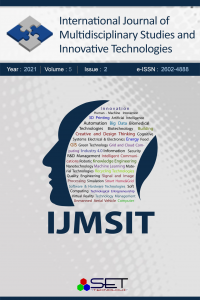Exploiting Agent-based Modeling and Simulation to Observe the Impact of Parental Attitudes on Behaviors of Schoolchildren
Abstract
Agent-based modeling is a new technique used to understand social processes facing in the social sciences. The agent-based model is a model in which agents are used to represent the actors of the social world. When simulations of models for social sciences are performed, information about social processes is obtained and future outcomes of those processes are anticipated by using agents. Agent based modeling has also become increasingly popular in the education domain. It is possible to represent students' interactions with each other and their teachers where the teacher and students are programmed as agents in a simulation environment. In the present study, the school environment is represented in a simulation environment and students having undesired behaviors and their interactions with classmates are observed in this environment in order to investigate the relationship between the attitudes of parents and the undesired behaviors of primary school students. If there are students having undesired behaviors in the class environment, it is needed to examine the cause of undesired behaviors. Solving problems in the classroom mostly depends on the families.
References
- [1] R. Conte, & M. Paolucci, “On agent-based modeling and computational social science”, Frontiers in Psychology, Hypothesis and Theory Article, 5, 668, doi: 10.3389/fpsyg.2014.00668, 2014.
- [2] J. M. Epstein, Generative Social Science Studies in Agent-Based Computational Modeling, 3th ed. United Kingdom: Princeton New Jersey, p. 384 , 2007.
- [3] D. .Klein , J. Marx, , & K. Fischbach, “Agent-Based Modeling in Social Science, History, and Philosophy,” An Introduction. Historical Social Research 43 (1): 7-27. doi: 10.12759/hsr.43.2018.1.7-27, 2018.
- [4] L.Tesfatsion, , & K. L Judd, Handbook of Computational Economics, In Leigh T. and Kenneth LJ (eds.) Agent-based Computational Economics, 1187-1233, 2006.
- [5] S. Gürsoy, Anne- Baba Rehberliği İçin İpuçları, Yeni Eğitim, 57-59, 2006.
- [6] A. Ekşi, Çocuk, Genç, Ana Babalar, 1. ed. Ankara: Bilgi Yayınevi, 11-269, 1990.
- [7] H. Yavuzer, Çocuk Psikolojisi, 18.ed. İstanbul: Remzi Kitabevi, 15-346, 1999.
- [8] F. Kılıçarslan, Çocuğumu Nasıl Eğitmeliyim, 1. ed. İstanbul: Turkuaz Kitaplığı, 11-129, 2009.
- [9] C. Macal & M. J. North, “Agent-based modeling and simulation,” In Proceedings of the 2009 Winter Simulation Conference, Austin, Texas, 2009, 13, 86-98 Piscataway, New Jersey: Institute of Electrical and Electronic Engineers, Inc.
Abstract
References
- [1] R. Conte, & M. Paolucci, “On agent-based modeling and computational social science”, Frontiers in Psychology, Hypothesis and Theory Article, 5, 668, doi: 10.3389/fpsyg.2014.00668, 2014.
- [2] J. M. Epstein, Generative Social Science Studies in Agent-Based Computational Modeling, 3th ed. United Kingdom: Princeton New Jersey, p. 384 , 2007.
- [3] D. .Klein , J. Marx, , & K. Fischbach, “Agent-Based Modeling in Social Science, History, and Philosophy,” An Introduction. Historical Social Research 43 (1): 7-27. doi: 10.12759/hsr.43.2018.1.7-27, 2018.
- [4] L.Tesfatsion, , & K. L Judd, Handbook of Computational Economics, In Leigh T. and Kenneth LJ (eds.) Agent-based Computational Economics, 1187-1233, 2006.
- [5] S. Gürsoy, Anne- Baba Rehberliği İçin İpuçları, Yeni Eğitim, 57-59, 2006.
- [6] A. Ekşi, Çocuk, Genç, Ana Babalar, 1. ed. Ankara: Bilgi Yayınevi, 11-269, 1990.
- [7] H. Yavuzer, Çocuk Psikolojisi, 18.ed. İstanbul: Remzi Kitabevi, 15-346, 1999.
- [8] F. Kılıçarslan, Çocuğumu Nasıl Eğitmeliyim, 1. ed. İstanbul: Turkuaz Kitaplığı, 11-129, 2009.
- [9] C. Macal & M. J. North, “Agent-based modeling and simulation,” In Proceedings of the 2009 Winter Simulation Conference, Austin, Texas, 2009, 13, 86-98 Piscataway, New Jersey: Institute of Electrical and Electronic Engineers, Inc.
Details
| Primary Language | English |
|---|---|
| Subjects | Engineering |
| Journal Section | Articles |
| Authors | |
| Early Pub Date | November 18, 2021 |
| Publication Date | November 30, 2021 |
| Submission Date | October 17, 2021 |
| Published in Issue | Year 2021 Volume: 5 Issue: 2 |

